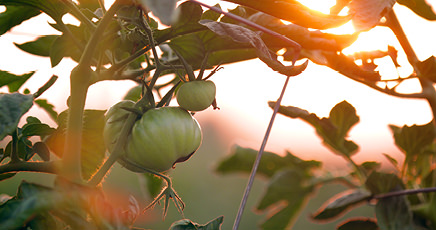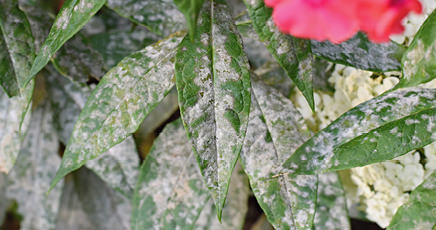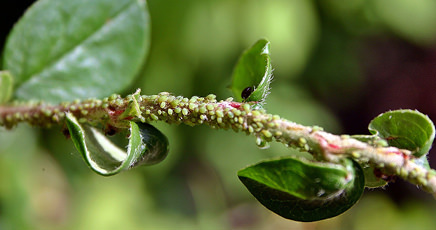LEARNING ACTIVITY
STORY
The school garden classes were amongst Beth’s favourite. It felt great to be outside where she can chat with her friends and get her hands dirty. Beth and her friends were responsible for the rockmelons which grew well in their subtropical climate. While watering and weeding, Beth noticed lots of tiny insects on the new leaves of the rockmelon plants. There were too many to remove by hand! Beth and her friends Hayley and Eliza started researching for pest species that feed on rockmelons, and were able to identify the tiny insects as aphids. The girls agreed to prepare a natural pesticide to manage these aphids to they didn’t spoil the rockmelon crop they had been tending to for close to three months.

Gardening and growing healthy plants is a priority for Junior Landcarers as plants are vulnerable to pests and diseases. Creating the right conditions for growth and investing in good care strategies can help keep them healthy in the long term. Using natural pesticides to treating plant pests along with regular monitoring can help. These pesticides are made from naturally occurring ingredients, they rid the plants of pests, limit diseases whilst keeping the plants, soil, wildlife, water sources and beneficial insects free from any unpleasant chemicals or negative environmental impacts.
For children to:
• understand how to cultivate healthy plants using organic gardening methods
• look to natural ingredients as a solution to ridding plants of unwanted pests and diseases
• know how to make a natural pesticide and evaluate the results of using it.
Application of pesticides is generally weather dependent. It is best to apply the spray in non-windy conditions so as to prevent drift. Certain pests will be present in specific seasons and regions.
Introduction
Having healthy plants is dependent on a variety of factors. Before commencing this activity, be sure to identify the pest species on your plants. Certain pesticides are only suitable to treat specific pest species. The natural pesticide featured in this learning activity is to treat sucking pests such as aphids and scale.
*If all materials have been previously sourced.
Checklist
Instructions
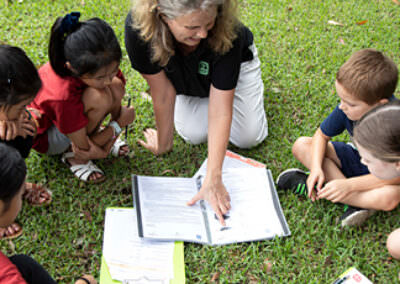
STEP 1
Provocation
What do plants need to be healthy to grow and create the produce we eat? We have some new plants in our food garden. We would like to have the best results possible from these plants, what can we do to keep them healthy?
Use the activity sheet to help build the discussion.
What does a flowering plant need to grow? Water, sunlight, air, soil, care.
What helps to keep plants healthy? Rich nutrients in the soil, lots of beneficial pollinators, mulch, lots of care, pest and disease control.
What are some of the threats to healthy plants? Pests, disease, weather variations, planting in the wrong season, neglect.
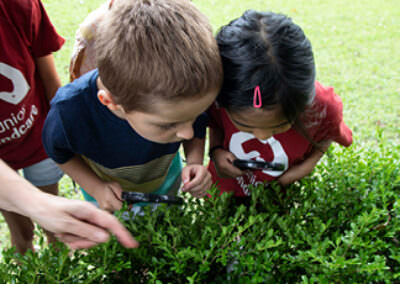
STEP 2
What is a pesticide? Discuss that a pesticide is a solution created to treat, deter or destroy pests and diseases that attack plants.
Why should we use a natural pesticide? Discuss that while treating plant pests and diseases, we do not want to harm the soil, water sources, other plants, beneficial insects, wildlife or people. Pesticides are often pest species specific.
Discuss how to identify plant pests. Use the online guides or a book for background information.
Aphids and scale are common garden pests so we will look at ways to manage aphids by preparing a solution using environmentally friendly ingredients.
Children can investigate these and other insects in their garden, using magnifying glasses to look up close. Refer to the online and printable resources to learn and help with identification.
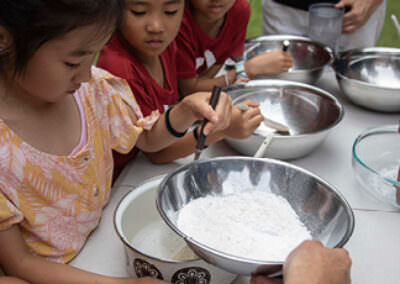
STEP 3
Keep in mind what resources you need to make the natural pesticide. Outline safe practices when using heating utensils and pesticide ingredients.
To create the natural pesticide:
- add two tablespoons of soap flakes to one litre of warm water in a saucepan or in a heatproof bowl.
- stir carefully with a wooden spoon until soap flakes are completely dissolved. Allow time to cool.
Your solution is now ready to be poured into a spray bottle.
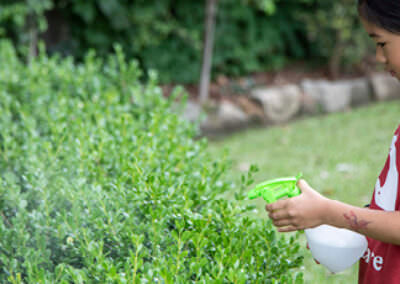
STEP 4
Apply the solution by spraying the top and the underside of each leaf and along the stems. Aphids normally congregate on the underside of the leaf so pay special attention to this area.
The natural pesticide should immediately destroy the garden pests. Reapply should the aphids or scale reappear on your plants.
Children can use the activity sheet to reflect on what actions they will take to monitor plants and assess if the natural pesticide has been effective.
Extension Activity
Investigate companion planting as a way to manage plant pests.
Find out how you can use bugs to control unwanted pests.
Curriculum and Framework Links
SCIENCE
Year 2: ACSHE035
Year 3: ACSHE050, ACSIS054
Year 4: ACSSU073
Year 5: ACSSU043, ACSHE083
Year 6: ACSSU094, ACSHE100
Year 7: ACSSU112, ACSHE120
Year 9: ACSSU176
DESIGN & TECHNOLOGIES
Years 3/4: ACTDEK012
Years 5/6: ACTDEK021, ACTDEP026
CROSS CURRICULUM PRIORITY
Aboriginal and Torres Strait Islander Histories and Cultures
Sustainability
MY TIME OUR PLACE: FRAMEWORK FOR SCHOOL AGE CARE
Outcomes 2 and 4
Reference List
ONLINE RESOURCES
What bug is that? A guide to Australian insect families from CSIRO.
Insect fact sheets from the Australian Museum.
Garden geek girl gives an overview of common garden pests as well as a range of ideas for pest and disease control in food gardens.
Homemade remedies fact sheet from Gardening Australia.
Watch
Learn more about why plant health is important in this fun animation.
Give bugs a chance from Gardening Australia focuses on using bugs to control unwanted pests.
TED Ed- Do we really need pesticides?
Aphids on rose with hoverfly larva. Time lapse of natural control of garden pests.
Printable resource
The Australian Museum has a free Bugwise Invertebrate Guide to help your children identify common spiders, insects and other invertebrates from illustrations.
Read
Pests, Diseases and Beneficials, Friends and Foes of Australian Gardens. Author: F. David Hockings from CSIRO publishing (printed text).
We value your feedback
When you have finished this learning activity, please tell us what you think with our survey.
Your feedback will help Landcare Australia improve the activities in the Junior Landcare Learning Centre.
Why not try one of our other Junior Landcare learning activities?
Love Letters to the Land
Biodiversity|First Nations Perspectives|Food Production|Waste Management
Creating a food garden: vision
Food Production
Creating a food garden: planting
Food Production
Creating a food garden: installing a no dig garden bed
Food Production
